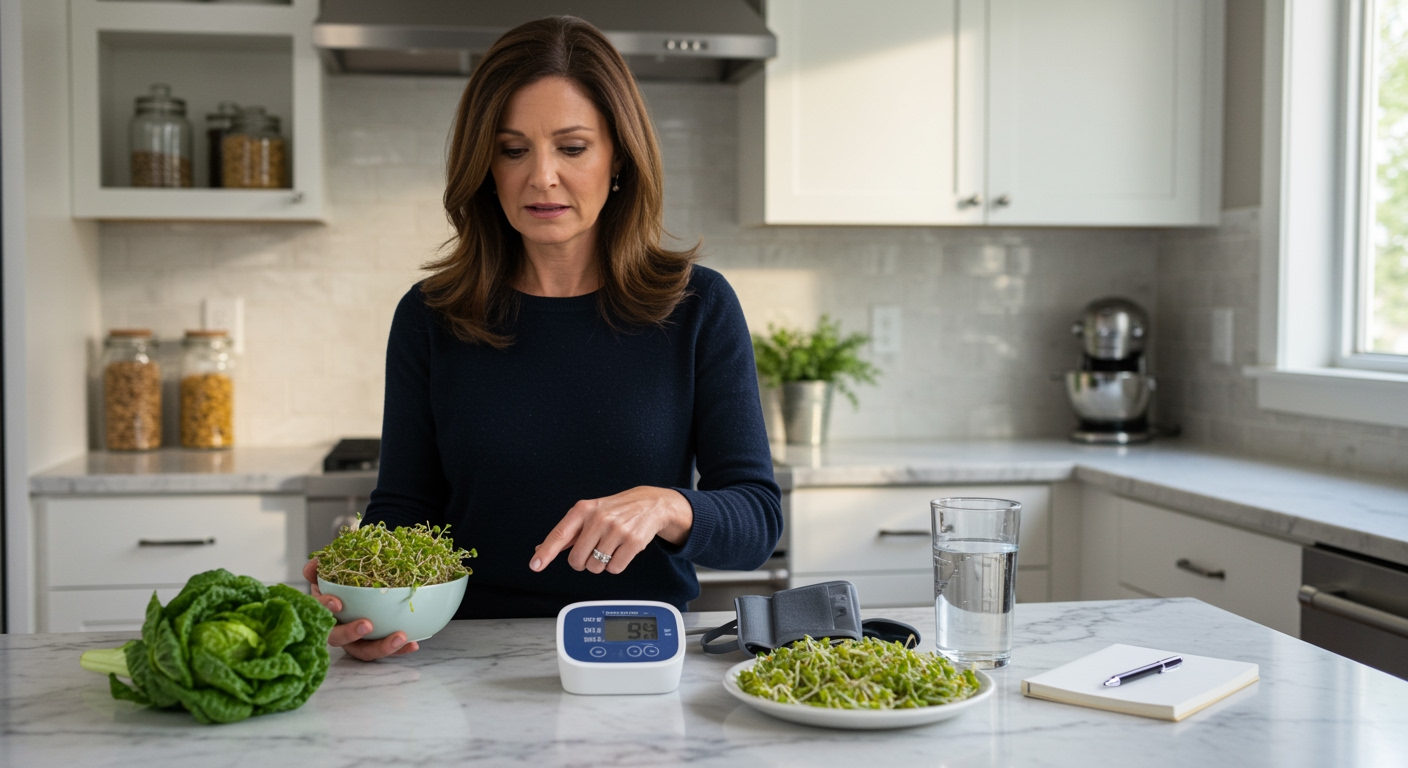✪ Key Takeaway: Cabbage sprouts may slightly lower blood pressure but rarely cause dangerous drops in people with existing hypotension.
Introduction
Your blood pressure monitor shows those familiar low numbers again, and now you wonder if that handful of cabbage sprouts you just ate will make things worse.
You might be asking this question because you have hypotension and want to avoid foods that could drop your blood pressure even lower, or perhaps someone warned you about cruciferous vegetables affecting cardiovascular health.
Hi, I am Abdur, your nutrition coach, and today I am going to explain exactly how cabbage sprouts affect low blood pressure and whether you should worry about including them in your diet.
What Makes Cabbage Sprouts Different From Regular Cabbage?
Cabbage sprouts contain concentrated nutrients that are significantly higher than their mature counterparts.
These tiny powerhouses pack up to 40 times more vitamin C and 10 times more vitamin K than fully grown cabbage heads.
The sprouting process activates enzymes that break down complex compounds into more bioavailable forms, making nutrients easier for your body to absorb and utilize.
Cabbage sprouts also contain higher levels of glucosinolates, sulfur-containing compounds that give cruciferous vegetables their distinctive taste and health benefits.
These compounds convert into bioactive substances like sulforaphane when you chew or digest the sprouts, which can influence various bodily functions including cardiovascular health.
✪ Fact: Cabbage sprouts reach peak nutrient density within 3-5 days of germination before levels start declining.
How Do Cabbage Sprouts Actually Affect Blood Pressure?
Research shows that cruciferous vegetables like cabbage sprouts can have a mild blood pressure lowering effect through several mechanisms.
The high potassium content in cabbage sprouts helps your kidneys excrete excess sodium, which can lead to modest reductions in blood pressure readings.
Nitrates naturally present in these sprouts convert to nitric oxide in your body, causing blood vessel relaxation and improved circulation.
The antioxidants in cabbage sprouts, particularly vitamin C and flavonoids, help protect your blood vessels from oxidative stress and support healthy endothelial function.
However, the blood pressure lowering effects are typically modest, usually resulting in decreases of 2-4 mmHg systolic and 1-2 mmHg diastolic pressure.
For most people with low blood pressure, this small reduction is unlikely to cause symptoms or health problems.
✪ Pro Tip: Monitor your blood pressure for a week after adding cabbage sprouts to identify any personal sensitivity patterns.
When Should You Be Concerned About Cabbage Sprouts?
People with severe hypotension (blood pressure below 90/60 mmHg) should exercise more caution when adding large amounts of cabbage sprouts to their diet.
If you experience symptoms like dizziness, fainting, or extreme fatigue after eating cabbage sprouts, you might be particularly sensitive to their effects.
Those taking blood pressure medications should discuss adding significant amounts of cruciferous vegetables with their healthcare provider to avoid additive effects.
The timing of consumption matters too – eating large portions of cabbage sprouts on an empty stomach might enhance their blood pressure lowering effects.
Watch for warning signs like sudden drops in energy, lightheadedness when standing, or unusual weakness after meals containing cabbage sprouts.
Most healthy adults can safely consume 1-2 cups of cabbage sprouts daily without experiencing problematic blood pressure changes.
✪ Note: Keep a food and symptom diary to track how different amounts of cabbage sprouts affect your individual response.
What Are The Safe Ways To Include Cabbage Sprouts?
Start with small portions of about 1/4 cup and gradually increase the amount over several weeks to assess your tolerance.
Combine cabbage sprouts with foods that naturally support healthy blood pressure, such as lean proteins and healthy fats like avocado or olive oil.
Eating cabbage sprouts with meals rather than alone can help moderate their effects and provide sustained energy release.
Consider cooking methods that might reduce their potency – light steaming or sautéing can make cabbage sprouts easier to digest and potentially less impactful on blood pressure.
Balance your intake throughout the day rather than consuming large amounts in a single meal to avoid sudden changes in blood pressure.
Stay well-hydrated when eating cabbage sprouts, as proper hydration helps maintain stable blood pressure levels.
If you notice any concerning symptoms, reduce the portion size or frequency rather than eliminating these nutritious foods completely.
✪ Pro Tip: Pair cabbage sprouts with naturally salty foods like olives or cheese to help counterbalance any blood pressure effects.
The Bottom Line
Cabbage sprouts can cause mild reductions in blood pressure, but they rarely create dangerous drops in people with existing hypotension when consumed in reasonable amounts.
Smart nutrition means understanding your body’s unique responses rather than avoiding healthy foods out of fear.
I would love to hear about your experiences with cabbage sprouts and blood pressure in the comments below – your insights help others make informed decisions about their health journey.
References
At NutritionCrown, we use quality and credible sources to ensure our content is accurate and trustworthy. Below are the sources referenced in creating this article:
- Medical News Today: 4 daily servings cruciferous vegetables broccoli kale may help lower blood pressure
- Cleveland Clinic: Benefits of cabbage
- Healthline: Benefits of cabbage
- PMC: PMC Article





